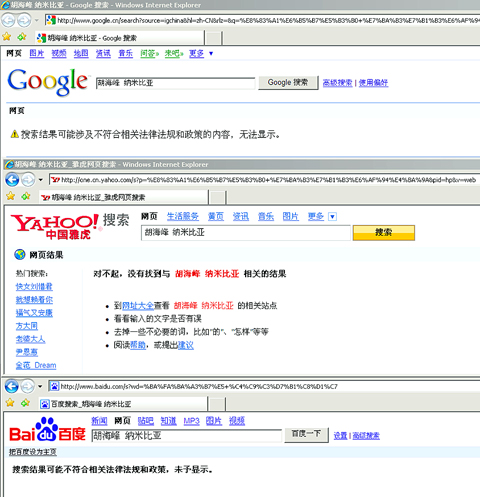China’s Internet censors blocked news yesterday about a graft probe in Namibia involving a firm linked to the son of Chinese President Hu Jintao (胡錦濤) as the state-run media ignored the sensitive issue.
Two Namibians and a Chinese national were arrested last week in Namibia as part of a probe into bribery allegations involving Nuctech, a company headed until last year by Hu’s 38-year-old son, Hu Haifeng (胡海峰).
Searches for information on the case and Hu Haifeng’s connection to it on Chinese Web portals turned up error messages such as: “The search results may contain content not in line with relevant laws, regulations and policies.”

PHOTO: BLOOMBERG
Such results on China’s heavily censored Internet are typically returned when a Web user seeks banned information.
China has a history of blocking access to sensitive data on the Internet, especially concerning politics and the lives of top leaders.
Popular sites such as Facebook, YouTube and Twitter have been blocked for weeks as censors sought to limit the information flow over the deadly unrest in Xinjiang and the 20th anniversary of the Tiananmen Square crackdown.
The US-based China Digital Times, which monitors Web developments in China, said propaganda officials had issued an order banning various Internet searches related to the Nuctech case.
China Digital Times and media watchdog Reporters Without Borders said it appeared the Nuctech Internet censorship had been in place for a few days.
China’s mainstream media is tightly controlled by the government, and newspapers as well as TV news have also made no mention of the Nuctech case in recent days.
Hu Haifeng was president of Nuctech, which provides scanning technology, until last year, when he was promoted to Chinese Communist Party secretary of Tsinghua Holdings, which controls Nuctech and more than 20 other companies.
Nuctech provides security scanning equipment.
Nuctech representative Yang Fan (楊帆) and two Namibians, Teckla Lameck and Jerobeam Mokaxwa, were arrested after Namibia’s Anti-Corruption Commission (ACC) discovered that a US$12.8 million down payment on 13 scanners had been diverted to a firm called Teko Trading owned by the two Namibians.
Nuctech has a Namibian government contract to supply security scanning equipment in a US$55.3 million deal, paid for with a Chinese loan granted when the Chinese president visited the country in 2007.
Investigators say the down payment was diverted to Teko Trading between March and April.
All three of the accused later drew large sums from the Teko account, with Yang taking 16.8 million Namibian dollars (US$2.1 million), most of which he is said to have paid into an investment fund, investigators said.
China’s foreign ministry declined comment when contacted by reporters about the case on Wednesday, referring queries to Nuctech.
Staff at Nuctech’s Beijing-based headquarters, however, also declined comment.
“We never speak to the media,” a woman who answered the phone said.

A magnitude 7.0 earthquake struck off Yilan at 11:05pm yesterday, the Central Weather Administration (CWA) said. The epicenter was located at sea, about 32.3km east of Yilan County Hall, at a depth of 72.8km, CWA data showed There were no immediate reports of damage. The intensity of the quake, which gauges the actual effect of a seismic event, measured 4 in Yilan County area on Taiwan’s seven-tier intensity scale, the data showed. It measured 4 in other parts of eastern, northern and central Taiwan as well as Tainan, and 3 in Kaohsiung and Pingtung County, and 2 in Lienchiang and Penghu counties and 1

FOREIGN INTERFERENCE: Beijing would likely intensify public opinion warfare in next year’s local elections to prevent Lai from getting re-elected, the ‘Yomiuri Shimbun’ said Internal documents from a Chinese artificial intelligence (AI) company indicated that China has been using the technology to intervene in foreign elections, including propaganda targeting Taiwan’s local elections next year and presidential elections in 2028, a Japanese newspaper reported yesterday. The Institute of National Security of Vanderbilt University obtained nearly 400 pages of documents from GoLaxy, a company with ties to the Chinese government, and found evidence that it had apparently deployed sophisticated, AI-driven propaganda campaigns in Hong Kong and Taiwan to shape public opinion, the Yomiuri Shimbun reported. GoLaxy provides insights, situation analysis and public opinion-shaping technology by conducting network surveillance

Taiwan is gearing up to celebrate the New Year at events across the country, headlined by the annual countdown and Taipei 101 fireworks display at midnight. Many of the events are to be livesteamed online. See below for lineups and links: Taipei Taipei’s New Year’s Party 2026 is to begin at 7pm and run until 1am, with the theme “Sailing to the Future.” South Korean girl group KARA is headlining the concert at Taipei City Hall Plaza, with additional performances by Amber An (安心亞), Nick Chou (周湯豪), hip-hop trio Nine One One (玖壹壹), Bii (畢書盡), girl group Genblue (幻藍小熊) and more. The festivities are to

AFTERMATH: The Taipei City Government said it received 39 minor incident reports including gas leaks, water leaks and outages, and a damaged traffic signal A magnitude 7.0 earthquake struck off Taiwan’s northeastern coast late on Saturday, producing only two major aftershocks as of yesterday noon, the Central Weather Administration (CWA) said. The limited aftershocks contrast with last year’s major earthquake in Hualien County, as Saturday’s earthquake occurred at a greater depth in a subduction zone. Saturday’s earthquake struck at 11:05pm, with its hypocenter about 32.3km east of Yilan County Hall, at a depth of 72.8km. Shaking was felt in 17 administrative regions north of Tainan and in eastern Taiwan, reaching intensity level 4 on Taiwan’s seven-tier seismic scale, the CWA said. In Hualien, the